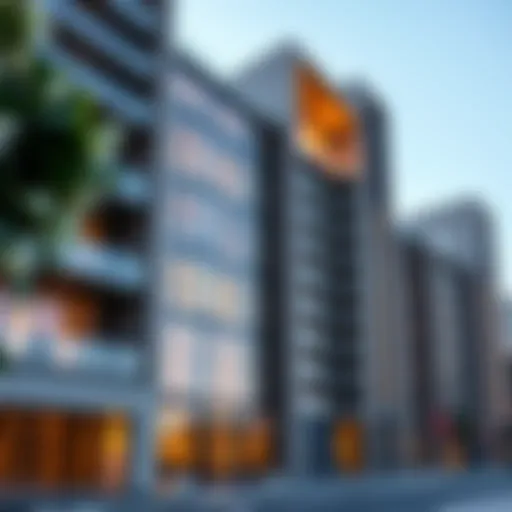Affordable Apartment Options in Dubai: A Comprehensive Guide


Intro
In recent years, Dubai has solidified its status as a global city, attracting both investors and residents alike. However, the soaring prices of real estate in this dynamic metropolis have cast a shadow over the dream of homeownership for many. Amidst this upscale ambiance, affordable apartment options do exist, waiting to be uncovered by savvy buyers and renters. This piece aims to dissect the landscape of budget-friendly apartments in Dubai, offering valuable insights into market dynamics, thriving neighborhoods, and what to consider when making a purchase or rental decision.
With a rapidly evolving market, understanding the nuances of price fluctuations, economic influences, and investment opportunities can make a significant difference in your property search. We will delve into aspects that help you successfully navigate through the wealth of options available, ensuring that quality is not sacrificed on the altar of affordability.
Let's unfold this journey by first taking a look at the current market situation.
Dubai's Real Estate Market Overview
Understanding Dubai's real estate landscape isn’t just a wise decision, it’s an essential foundation for anyone eyeing affordable apartment options in this vibrant city. Throughout the years, Dubai’s property market has become a multifaceted tapestry woven with cultural richness and economic potential. The allure of skyscrapers, luxury malls, and diverse communities can sometimes overshadow the reality of budget-friendly housing. However, the landscape is evolving, often creating opportunities for those who are keen on finding affordable living spaces.
Current Market Trends
The present state of the real estate market in Dubai is a lively reflection of the shifting economic tides. Recently, there’s been an inclination toward affordability, which is vital for a large segment of the population, including expatriates and young professionals. Trends indicate a gradual shift from opulent high-rise condos to accessible apartments, providing individuals the chance to sip their morning coffee while gazing at the city’s hustle and bustle without draining their wallets.
Some noteworthy trends shaping the market include:
- Increased Supply: Developers are recognizing the demand for affordable housing, leading to a richer variety of options for buyers.
- Greater Flexibility: More landlords are open to negotiations on rent or property prices, which makes it a buyer's market, giving potential homeowners a better bargaining position.
- Strategic Developments: New projects are focusing on areas that are currently underserved regarding budget-friendly options.
This means that whether you’re an investor, a first-time homebuyer, or simply someone interested in what Dubai offers, understanding these trends is pivotal for making informed decisions.
Demand for Affordable Housing
The continuous influx of expatriates and the steady growth in population have fostered a strong demand for affordable housing. With many residents looking to balance the high cost of living in Dubai, affordable apartments emerge as a practical solution. The economic climate, paired with a burgeoning job market, means more people are seeking cozy, budget-friendly homes that meet their essential needs without compromising quality or lifestyle.
Key factors contributing to this demand include:
- Affordable Living Standards: With rising costs in various sectors, there’s an increasing need for housing that aligns with reality. Buyers are more discerning than ever.
- Location Matters: People are drawn to communities that provide ease of access to work, schools, and leisure activities, all while being kind to their budgets.
- Diverse Demographics: It's not just families looking for affordable housing; young professionals and students are on the hunt as well, broadening the market's scope.
"Finding the right apartment in Dubai doesn’t have to be a treasure hunt; understanding these demands sets the stage for smart choices."
In resumen, keeping an eye on market trends and understanding the dynamics driving demand for affordable homes in Dubai offers invaluable insights for anyone considering entering the real estate scene in this bustling metropolis. By grasping these elements, you’ll be better positioned to navigate your way to an affordable apartment that feels like home.
Identifying Cheap Apartments
Identifying cheap apartments in Dubai is a pivotal step in navigating the city’s bustling real estate market. With rising property prices and an influx of expatriates, the search for budget-friendly living spaces has become increasingly vital. This section will dissect the concept of affordability and the features that define budget-friendly apartments. As the real estate dynamics shift, knowing which apartments fall under the affordable bracket not only helps homebuyers save money but also ensures that they make informed decisions.
Defining Affordability
Affordability can be a tricky term to pin down. Generally, it refers to the portion of one’s income that can comfortably cover housing costs without putting a strain on other expenses. In the context of Dubai, the threshold for what constitutes affordable housing can significantly vary, shaped by factors like location, property size, and market fluctuations. Moreover, factors such as utility costs, maintenance fees, and community regulations can all play a role in true affordability assessment.
For many potential buyers, the idea of affordable housing hinges on a practical understanding of their finances. It’s essential not only to consider the purchase price but also to keep an eye on the long-term expenses. This understanding allows buyers to find properties that offer value without compromising their lifestyle.
Features of Budget-Friendly Apartments
When seeking budget-friendly apartments, several key features stand out, making these properties both appealing and practical.
Square Footage
Square footage is a crucial characteristic that defines what can be regarded as affordable living space. In Dubai, where metropolitan living often means higher costs per square foot, understanding how much space you really need is fundamental.
A two-bedroom apartment in a sought-after area may seem ideal, but if it comes with a hefty price tag per square foot, it might not be the best fit financially. On the flip side, smaller units in developing neighborhoods can provide residents with a cozy living space that fits their budget while still allowing for a convenient lifestyle.
Benefits:
- Less upkeep and maintenance is required for smaller spaces.
- They often come with lower utility bills due to shared spaces.
Disadvantages:
- Less room for future needs or changes in family size.
Location Proximity
Location is another key influencer in determining affordability. Proximity to essential services like schools, shopping centers, and public transport often dictates livability and convenience. Apartments located slightly further away from the iconic landmarks of the city or popular districts may offer lower prices while still maintaining easy access to these amenities.


Living on the periphery can sometimes provide a more tranquil environment, contrasts the hustle and bustle of the heart of Dubai, making it an attractive option for families or professionals seeking some peace without completely sacrificing convenience.
Benefits:
- Cheaper rent or purchase prices, especially in gentrifying neighborhoods.
- Quieter surroundings and often better community feel.
Disadvantages:
- Longer commuting times if working in business districts.
Amenities Included
Amenities can make or break the overall impression of budget-friendly apartments. Properties that include shared facilities like pools, gyms, and parks can enhance the living experience significantly. However, it’s important to assess whether these amenities justify the price.
An apartment might keep its base price lower by minimizing amenities, which could cater to individuals who prefer a more minimalistic lifestyle, focusing solely on the core functionalities of their living space.
Benefits:
- Attractive for renters looking for comprehensive living arrangements.
- Can enhance property value over time due to high demand for amenities.
Disadvantages:
- HOA fees can eat into overall affordability if amenities are included in maintenance costs.
Overall, identifying cheap apartments requires a holistic view of what makes a space both affordable and livable. By defining affordability in a broad sense and examining the key features of budget-friendly apartments, prospective buyers can better understand how to navigate the vibrant Dubai property market.
Popular Neighborhoods for Affordable Apartments
The quest for affordable living spaces in Dubai often leads potential buyers to explore specific neighborhoods that offer value for money. Each area has its unique character, amenities, and price structures, making them vital to consider when searching for a suitable home. This section dives into some of the most appealing neighborhoods for budget-conscious buyers, shedding light on what makes them stand out within the bustling Dubai real estate market.
Dubai Marina
Dubai Marina shines brightly as one of the city's most iconic areas. While known for luxury high-rises and lavish lifestyle, many may overlook its potential for affordable housing. The contrast provides a truly unique opportunity for those looking for budget-friendly options near the water.
Many of the older buildings, while still in good condition, offer more reasonable prices compared to newly built complexes. Living here means you’re a stone's throw away from a vibrant lifestyle filled with restaurants, shopping, and leisure activities.
Renters and potential buyers often find appealing deals in properties that are slightly dated yet well-maintained, dishing out stunning marina views without breaking the bank. Plus, with public transport like the Dubai Metro and tram services nearby, commuting becomes a breeze.
Jumeirah Village Circle
Jumeirah Village Circle (JVC) has emerged as a popular hotspot for those seeking budget-friendly housing options. It’s easy to see why: JVC ticks off multiple boxes for both convenience and community.
Families and young investors alike are drawn to its well-planned layout, parks, and schools all within arm's reach. Your choices here often include mid-rise buildings and townhouses that offer decent amenities without the high price tag. The sense of neighborhood is palpable, fostering a community feel that makes it ideal for long-term living.
Additionally, the strategic location of JVC allows for relatively easy access to major roads, facilitating commutes to hot spots across Dubai.
Deira
Deira stands as a testament to Dubai's rich cultural tapestry. Though it's known for its bustling markets and historical significance, it also presents some of the most affordable housing solutions in the city.
When navigating through the vibrant streets, potential buyers encounter a mix of apartments set in diverse styles and layouts, often at prices significantly lower than in newer districts. The surrounding area buzzes with activity, from traditional souks to modern shopping centers. This mix of old and new creates a unique atmosphere that many residents cherish.
Another bonus is the ease of access to public transportation, including metro stations, which facilitates commuting and short trips around the city.
Al Quoz
Al Quoz, often overlooked in discussions about Dubai's real estate, has increasingly become a go-to for those seeking affordable apartments. Its eclectic nature, home to art galleries and warehouses, gives it a distinctive vibe that can appeal to creative types.
The residential developments here are primarily located in the quieter parts of the area, allowing one to enjoy a peaceful lifestyle while remaining close to the energetic arts scene. Many of the residential buildings offer ample space and reasonably priced rentals, appealing to young professionals and families alike.
In addition, the area benefits from strategic proximity to both Sheikh Zayed Road and Al Khail Road, making it a smart choice for anyone working in or around the heart of Dubai.
The affordability of housing in Al Quoz, alongside these additional factors, allows residents to enjoy a mix of culture and convenience without the hefty price tag that often comes with living in trendier districts.
Understanding Pricing Factors
In the bustling landscape of Dubai's real estate market, the pricing of apartments presents a complex web of influences. Understanding these pricing factors is essential for anyone considering a purchase. Knowledge of how pricing is determined can greatly assist potential buyers, whether they are seasoned investors or first-time homebuyers. This section breaks down the main considerations impacting apartment prices in Dubai, helping readers navigate this intricate market with greater ease.


Economic Influences
The economic backdrop of Dubai directly ripples through the property market. For instance, when the economy thrives, demand typically rises, often leading to higher prices. Factors such as inflation rates, employment levels, and foreign investment trends all play crucial roles. A prime example of this can be seen post-Expo 2020, where a surge in tourism and business activity has fueled a competitive real estate environment.
On the flip side, during economic downturns, such as during the 2008 financial crisis, property prices can stagnate or even decrease. Buyers should keep a finger on the pulse of economic indicators, as this will help in predicting market shifts and potential pricing trends.
Additionally, fluctuating oil prices can impact Dubai’s economy and, subsequently, its real estate market. Given that oil revenue significantly contributes to the UAE's budget, lower oil prices can lead to reduced spending and investment in real estate. Therefore, staying informed about global economic conditions is not just advisable; it is vital.
Property Condition and Age
The age and condition of an apartment play directly into its pricing, often acting as a double-edged sword. Newer properties, by virtue of their contemporary designs and modern facilities, often command a premium price. These apartments might come with updated amenities and energy-efficient appliances, appealing particularly to young professionals or families looking for a hassle-free move.
On the other hand, older properties may be more affordable, but they might require significant renovation or touch-ups. Potential buyers should weigh the cost of these repairs against the savings on the initial price. Knowing what needs fixing—or not—can save headaches down the line.
It's wise to invest in a thorough inspection before buying an older property. This can uncover hidden issues, such as plumbing faults or electrical problems, which can become costly if left unattended. In summary, be prepared to consider both the purchase price and the potential expenses that might arise from a property's condition and age.
Market Supply and Demand
Like many markets, real estate pricing in Dubai is heavily influenced by the basic principles of supply and demand. When there are more buyers than available apartments, prices can skyrocket. Conversely, an influx of new developments can saturate the market, leading to lower prices and more competitive options for buyers.
The changes in supply can vary notorious depending on governmental regulations, economic shifts, or even social factors. For instance, if the government eases regulations on foreign buyers or introduces incentives, demand may surge quickly. Neighborhoods that are seeing new developments generally reflect healthier market activity, attracting more investors looking for a slice of the action.
Here's a closer look at specific cyclic trends:
- If a popular neighborhood begins to fill its apartment listings, prices will likely rise.
- Conversely, if multiple properties become available simultaneously, expect some room for negotiation on prices.
Ultimately, understanding the current state of supply and demand can provide a much clearer picture of what is reasonable to expect in terms of pricing. Buyers should stay informed about market cycles, as these can have substantial impacts on what constitutes a fair price for an apartment in Dubai.
"Understanding these pricing factors is key to making informed decisions in the property market."
By analyzing these critical elements, potential buyers can navigate the waters of Dubai's real estate market with more confidence, ensuring they make smart investment choices.
Legal Aspects of Buying Property in Dubai
Navigating the legal framework when purchasing property in Dubai is critical for any buyer interested in affordable apartments. With the city's evolving real estate market, understanding the legal guidelines is vitally important. It provides potential buyers with a strong foundation before making a financial commitment.
Contractual agreements, ownership regulations, and local laws create a safety net for both buyers and sellers.
Understanding Ownership Rights
When examining property ownership in Dubai, it’s essential to grasp the different types of ownership rights available.
In the Emirate, ownership can be classified into freehold and leasehold. Freehold means full ownership, allowing the buyer to sell or lease the property without restrictions. This method is often favored by many wanting their own slice of Dubai.
On the flip side, leasehold offers partial ownership for a set number of years, typically up to 99. Buyers need to be well-versed about which option suits their long-term needs. With ownership questions, clarity can save buyers from potential pitfalls later on.
"Knowing your ownership rights can prevent future legal headaches, ensuring peace of mind and stability for investors."
Required Documentation
Before diving into the property market, gathering the right documentation is paramount. Buyers are often surprised by the extent of paperwork needed. Here’s a checklist to streamline the process:
- Passport and residence visa – Essential for identity verification.
- Property Registration Fee – Typically 4% of the property’s value.
- No Objection Certificate – A requirement from the developer, confirming no issues with the transaction.
- Proof of Income – Often needed for mortgage applications.
Ensuring all paperwork is in order can expedite the purchase process. Missing a document can throw a wrench in the gears, causing unnecessary delays.
Dealing with Developers and Agents
Working with reputable developers and agents is crucial when considering an apartment purchase in Dubai. Given the complexities that come with real estate transactions, a competent agent can be the difference between a seamless experience and one filled with hurdles.
Research and recommendatioons are key. Start by confirming whether agents are registered with the Dubai Land Department. This registration provides legitimacy and gives buyers leverage should disputes arise. Furthermore, it is beneficial to understand the developer’s track record: look at their completed projects, customer reviews, and overall reputation.
Communication should be clear and direct. Never hesitate to ask questions. As the buyer, you deserve transparency, whether it is regarding fees, timelines, or warranties on the property.
Financing Options for Buyers
Understanding the financing landscape is crucial when searching for affordable apartments in Dubai. Navigating through various financing avenues not only empowers potential buyers but also allows them to seize ownership opportunities that they may otherwise overlook. The affordability of housing doesn't solely rest on the price tag; the terms of financing greatly influence purchasing power, shaping one's ability to make informed decisions. From mortgages to government incentives, various paths lead to the ideal property.


Mortgage Opportunities
Mortgages often serve as the backbone of property financing. In Dubai, several banks and financial institutions cater to a diverse clientele, each offering a range of mortgage products tailored to different needs and financial situations.
When considering mortgage options, it's essential to look at factors such as interest rates, loan tenure, and down payment requirements. For instance, many banks may offer an attractive fixed-rate mortgage where monthly payments remain constant throughout the term. This feature can be particularly appealing to first-time buyers who prefer predictability in their budgeting.
Here are some critical elements to consider when evaluating mortgage options:
- Interest Rates: Compare rates from various lenders. A small difference in percentage can lead to significant savings over time.
- Loan Term: Most mortgage loans can range from 5 to 30 years. A longer term can result in lower monthly payments but may incur higher overall interest.
- Down Payment: In Dubai, the typical down payment can be anywhere from 10% to 25% of the property price, depending on the lender and the buyer's residency status.
By taking the time to shop around, buyers can identify mortgage solutions that align with their financial capabilities and long-term goals. Remember, being choosy pays off.
Government Incentives
Government initiatives play a pivotal role in promoting affordable housing in Dubai. Several programs aim to ease the financial burden on buyers. These incentives might include reduced registration fees, subsidized mortgages, or even grants for first-time buyers. For instance, one prominent initiative is the Mohammed Bin Rashid Housing Establishment, which offers low-interest loans and aims to ensure that a broad spectrum of residents can access affordable housing.
Here’s a quick overview of some government incentives to consider:
- Reduced Fees: Some programs may slash property registration costs, making initial investments less daunting.
- Subsidized Mortgages: This can lower interest rates specifically for low-income and first-time buyers, providing a fair chance at home ownership.
- Incentives for Developers: Government backing for developers focused on affordable housing could result in more budget-friendly options in the market.
Overall, being aware of these financial assists can make a substantial difference. It's advisable to consult the official Dubai Land Department website or attend community workshops to get the most up-to-date information on available government incentives related to property purchases.
Understanding these financing options equips buyers with the knowledge needed to make informed choices, optimizing both budget and outcomes in the bustling Dubai real estate market.
Tips for First-Time Buyers
Navigating the bustling real estate market in Dubai can be daunting, particularly for first-time buyers. With various factors at play—from pricing and locality to legal nuances—it is crucial to approach this journey with a clear strategy. These tips not only help streamline your property search but also potentially lead to sound financial decisions that serve you well in the long run.
Conducting Market Research
When it comes to purchasing an apartment, market research isn’t just beneficial; it’s essential. Understanding the lay of the land enables buyers to discern patterns, prices, and opportunities that may not be visible at first glance. Start by diving into various online platforms that showcase listings, such as Property Finder or Bayut. Here are some key aspects to consider during your research:
- Comparative Analysis: Look into similar properties within your target neighborhoods. Analyzing price trends can reveal if a listing is overpriced or a rare steal.
- Future Developments: Check the projected developments in Dubai. Areas poised for growth often have a slightly higher price now but can bear lucrative returns later.
- Local Amenities: Understand what your chosen neighborhood offers. Proximity to schools, malls, and parks can greatly influence your quality of life and the apartment's resale value.
With a thorough analysis, you won’t just identify suitable options—you’ll also gain insights into what a fair price looks like in different parts of the city.
Setting a Realistic Budget
Setting a budget is like mapping out your route before hitting the road; without it, you could end up lost or even running in circles. A realistic budget takes into account not just the purchase price of the apartment but all associated costs like maintenance fees, utility bills, and property taxes.
- Total Cost of Ownership: Buyers often underestimate the ongoing costs related to their new home. Be sure to factor in service charges, insurance, and potential renovations.
- Neighborhood Variances: Prices may vary drastically by community, so ensure that your budget aligns with what neighborhoods you're considering.
- Financing Considerations: Investigate mortgage terms and interest rates that banks offer. Some lenders might provide favorable conditions for first-timers that can enhance your purchasing power.
A tightly defined budget not only keeps your finances in check but also reduces stress during the buying process. This clarity allows you to focus on what truly matters—finding that right apartment for you.
"A well-planned budget can liberate your mind and guide your choices. Only then can you make an informed decision without unnecessary pressure."
By adhering to these tips, first-time buyers equip themselves with the knowledge to navigate the complex Dubai real estate market. Remember, preparation is half the battle. The more informed you are, the more confidence you’ll have in making such an important investment.
The Future of Affordable Housing in Dubai
The future of affordable housing in Dubai holds significant promise, reflecting the city’s commitment to meeting the diverse needs of its residents. As Dubai continues to grow as a global metropolis, the demand for budget-friendly living spaces is becoming more pronounced. Understanding the trajectory of affordable housing in this vibrant city is critical for several reasons.
First, affordable housing contributes to social stability, fostering inclusive communities where a mix of cultures and backgrounds can thrive. Second, it presents an investment opportunity for real estate agents and investors looking to tap into an increasingly competitive market. Finally, it is essential for potential homebuyers who are seeking quality housing without breaking the bank.
Predicted Market Growth
The growth potential in Dubai's affordable housing segment is noteworthy. Experts predict a steady increase in new projects focusing on affordable units, influenced by several factors.
- Government Initiatives: The UAE government has been proactive in rolling out policies aimed at bolstering the availability of affordable housing. This includes financial incentives for developers that prioritize budget apartments.
- Population Increase: The ongoing influx of expatriates and foreign workers—combined with plans for future events like Expo 2020—has fueled demand for affordable units, compelling developers to allocate resources toward this sector.
- Economic Adjustments: As the economy recalibrates post-pandemic, there’s an increasing understanding among developers of the importance of catering to the middle-income bracket. This awareness is likely to shape market growth in the coming years, leading to an expansion in affordable properties.
Given these factors, the outlook for affordable housing remains robust, inviting innovations not just in design and construction, but also in financing options.
Emerging Neighborhoods to Watch
As the affordable housing landscape evolves, certain neighborhoods in Dubai are becoming hotspots for budget-conscious buyers. These areas stand out for their potential, accessibility, and the lifestyle they offer:
- Dubai South: This neighborhood is pegged for growth thanks to its strategic role in the city’s logistics and aviation sectors. With numerous upcoming projects, it promises a variety of affordable options in a community-focused setting.
- Town Square: Built around a concept of modern living, Town Square provides a range of affordable homes surrounded by parks and retail. Its family-oriented design makes it a sought-after location for young families.
- Ras Al Khor: Often overlooked, this area is gaining traction due to its affordable price points and proximity to the city center. With upcoming developments and enhanced connectivity, it could be a great bet for investors and homebuyers alike.
- Al Furjan: A community that is increasingly seen as an affordable alternative, Al Furjan benefits from its close-knit feel and is becoming a favorite for first-time buyers, particularly due to its convenient location.
"Investing in affordable housing is not just about profit; it's about building a community that thrives together."
For more insights on Dubai's housing market, consider checking out resources like Wikipedia or Britannica.
By keeping an eye on these developments, potential investors and buyers can make well-informed decisions as they explore their options in the vibrant market of Dubai.







